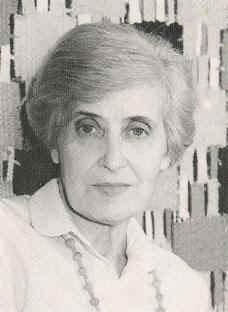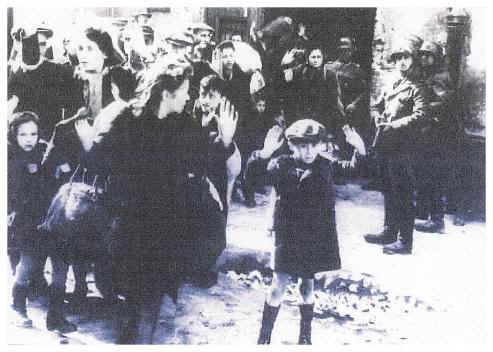The HyperTexts
Yala Korwin (1933-2014)
Holocaust Poetry

"I escaped to be a witness."
Yala Helen Korwin was born on February 7, 1933 in Lvov, Poland and died May 30, 2014 in New York
City. She was a poet, artist, author and teacher. She created over 400 paintings
and sculptures, some of which can be viewed in museums such as the Holocaust
Museum in Washington, D.C. A survivor of the Holocaust, after WWII she settled in
Paris where she married Paul Korwin, with whom she had two children, Danielle and
Robert. The Korwins moved to Queens in 1956, where Yala earned a Master's degree
Summa Cum Laude at Queens College. She went on to author six books. Her
Holocaust poetry has been published in Haggadah for Passover, in textbooks, and
set to classical music. Donations in her name can be made to the
Holocaust Museum, Washington D.C.
As a young girl, Yala Korwin survived a Nazi labor camp in the heart of Germany.
Having no place to return to after
the end of WWII, she let the winds carry her to France, where she lived as a refugee for ten years. In 1956 she emigrated to the United States
with her husband and young children. Her book To Tell the Story — Poems of the Holocaust was published in 1987 by the now-defunct
Holocaust Library. A poem she hopes to be remembered by is "The Little Boy with His Hands Up"
(the first poem on this page). It has been included in a
documentary film produced in Finland; discussed by M. Hirsch in Acts of Memory,
an essay published by Dartmouth College; used by Prof. R. Raskin of Denmark in his forthcoming scholarly study of the famous photograph; and included in the curriculum unit created by the Westchester
Holocaust Education Center. You can see the picture and read Yala's poem below.
Yala Korwin, her family and millions of Jews were victims of ethnic cleansing and genocide. If you are a student, teacher, educator, peace
activist or just someone who cares and wants to help, please read
How Can We End Ethnic Cleansing and Genocide Forever? and do what you can to make the world a safer, happier place for
children of all races and creeds.

The Little Boy with His Hands Up
Your open palms raised in the air
like two white doves
frame your meager face,
your face contorted with fear,
grown old with knowledge beyond your years.
Not yet ten. Eight? Seven?
Not yet compelled to mark
with a blue star on white badge
your Jewishness.
No need to brand the very young.
They will meekly follow their mothers.
You are standing apart
Against the flock of women and their brood
With blank, resigned stares.
All the torments of this harassed crowd
Are written on your face.
In your dark eyes—a vision of horror.
You have seen Death already
On the ghetto streets, haven't you?
Do you recognize it in the emblems
Of the SS-man facing you with his camera?
Like a lost lamb you are standing
Apart and forlorn beholding your own fate.
Where is your mother, little boy?
Is she the woman glancing over her shoulder
At the gunmen at the bunker's entrance?
Is it she who lovingly, though in haste,
Buttoned your coat, straightened your cap,
Pulled up your socks?
Is it her dreams of you, her dreams
Of a future Einstein, a Spinoza,
Another Heine or HalÚvy
They will murder soon?
Or are you orphaned already?
But even if you still have a mother,
She won't be allowed to comfort you
In her arms.
Her tired arms loaded with useless bundles
Must remain up in submission.
Alone you will march
Among other lonely wretches
Toward your martyrdom.
Your image will remain with us
And grow and grow
To immense proportions,
To haunt the callous world,
To accuse it, with ever stronger voice,
In the name of the million youngsters
Who lie, pitiful rag-dolls,
Their eyes forever closed.
Published in To Tell the Story ― Poems Of the Holocaust, Holocaust Publications, NY.
Also published in A Child at Gunpoint by Richard Raskin; please click here
for more information, or to order.
I Lost My Mother Tongue in the War
"Only in the mother tongue can one speak his own truth."—Paul Celan
Did you say that my words sound queer?
I lost my mother tongue in the war.
I'm sorry I disturb your ear.
Some lose their limbs when they volunteer,
I lost my tongue, as I said before.
That's why my words to you sound queer.
My tongue atrophied, fate brought me here.
The new tongue's clumsy; wound's still sore.
I'm sorry I disturb your ear.
The graft succeeded. Cost me dear.
It helped, but it could not restore.
I know my words to you sound queer.
Therapy goes on, and I fear
My case is hopeless evermore.
I'm sorry I disturb your ear.
Deprived of all that I held dear,
I went through insult, hunger, gore.
I know my words to you sound queer,
But I've stopped caring about your ear.
Song Is a Monument
In the old country our bards
sang Jewish sorrows, joys
of the rich and poor
of tailors, peddlers, scholars
mothers, fathers, children
lovers, sages, fools
Their hearths extinguished
ancient shtetls vanished
only songs remain
of the multi-petalled world
each petal a promise
each petal a voice
Do not mourn them in graveyards
their ashes mantle the earth
billow in clouds
swirl in eddies of rivers
dwell in rustling of trees
whirl in gusts of wind
Do not enshrine them in stone
let them breathe with your breath
Time grinds stone to dust
breath is a cradle of song
song is a monument
song is forever
Published in Beyond Lament, ed. By M.M. Striar; Northwestern Univ. Press.
I Dreamed Him Homeward
“The small steamer Struma, with 750 Jewish refugees from
Rumania and Bulgaria aboard, was blown down to pieces
in the Black Sea about five miles north of the Bosphorus,
apparently by a stray mine ... There have been no reports of
survivors.”
The New York Times, Feb 25, 1942
He came to say good-bye:
“My sheepskin cap fooled them,
they took me for their own.
The Iron Guard let me pass.
The others? From Prayer House
to slaughterhouse. Quartered. Hung.
One ship got through to Palestine.
There is hope. I’ll go.”
I dreamed him only from the knees down,
but knew it was my brother.
These elongated bones of youth,
so full of vigor,
yet wrapped in rotting flesh,
treaded the black-green water.
I was the raging sea.
It was my body that yielded
to spidery rolling of his limbs.
Walk, walk, my brother,
I’ll guide you where
you want to go! My voice was
a rumbling of waves.
A day after the dream,
a postcard, his hand: “We are
cooped here forever. No toilets.
Most are sick. The boat unseaworthy,
but the Turks wouldn’t let us land.
Mother pressed the letter
to trembling lips:
“Thank God. He lives.”
Walk, walk my brother
where you want to go.
No entry papers needed
anymore.
Published in Midstream and in Sarah’s Daughters Sing, ed. Henny Wenkart; publ. KTAV
Jˇzek's Fedora
That morning they sent us
to sort our headgear
in that hut, you know,
near the crematoria.
All sizes, shapes, colors,
caps, hats, bonnets,
hoods, berets, biggins.
Piles and piles of them.
Near one edge I spotted
my brown fedora
bought in Krakˇw
four years before
on Grodzka street.
I stared, thinking:
is it possible?
am I still alive?
It stared back at me
as if in disbelief
that I was still alive.
I said to Mietek:
pinch me, pinch me.
I need to know
if I am still alive.
Published in Midstream and To Tell the Story - Poems Of the Holocaust, Holocaust Publications, NY
Passover Night 1942
not a crumb of leavened
or unleavened bread
and no manna fell
no water sprang out
of the bunker’s wall
the last potato was gone
we sat and we munched
chunks of potato-peels
more bitter than herbs
we didn’t dare to sing
and open the door
for Elijah
we huddled and prayed
while pillars of clouds
massed above our heads
and pillars of fire
loomed like blazing traps
Published in Midstream
Published in To Tell the Story - Poems Of the Holocaust, Holocaust Publications, NY
Published in Blood to Remember, ed. Charles Fishman, publ. Texas Tech Univ. Press
April, 1945
In memory of a young Russian slave laborer
hit by a bullet hours before the liberation
Pockets of German resistance.
Whistles of missiles,
bursts of explosions.
Suddenly
all hubbub stops.
Roar of motorcycles.
Excited voices:
The Americans!
The Americans are coming!
We, the slaves, are free!
Young but stern faces.
No attention to cheering,
waving, smiles.
War is a serious business.
They thrust ahead. Eastward.
Return toward evening.
Some carry bodies
of fallen comrades.
Published in To Tell the Story - Poems Of the Holocaust, Holocaust Publications, NY
Such Innocent Words
Train camp shower
Gas furnace smoke
Bent and transfigured
Shoes hair soap
Mattress lampshade
Twisted defiled forever
Common words
Transmuted
Horror loss
Published in Midstream
Ecce Homo
The lives of great men are like legends—
difficult, but beautiful.
—Hirsh Goldszmit (Janusz Korczak)
His life was difficult but beautiful.
"Old Doctor"—gifted penman, teacher, sage,
a Polish Jew with childlike soul so full
of tenderness for those of tender age,
a father to the orphans in his care.
The wings of children, still so weak, should be
not clipped, but groomed by love, to cleave the air—
his favorite maxim and his constant plea.
Then Hitler's war. The orphans' lot was cast.
He went with them, a supreme sacrifice.
This noble lesson was to be his last:
All life is dear, but not at any price.
How hard to find the proper words that can
convey his life...Just this: Behold the Man.
You, Who Did Not Survive
Volumes have been written
to explain how they
who murdered you
came to power
and the reason for their crusade
against you.
For you—the truth lay
in black rifle-barrels
in crematorium fires.
None of you died because
of a great virtue
none because of a great sin.
You died because one dies
from exhaustion
you died because guns kill
because gas kills.
They accused you of greed
ordered you
to take off your shirts
before dying.
They extracted your gold teeth
after you died.
Published in Midstream
The HyperTexts

